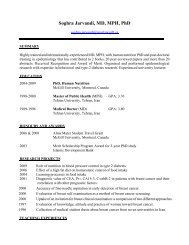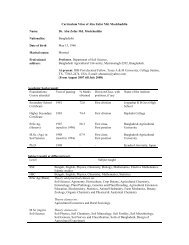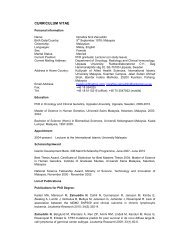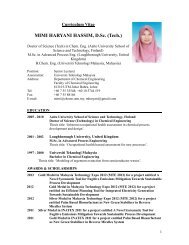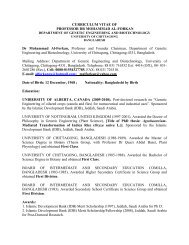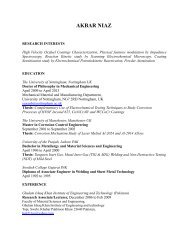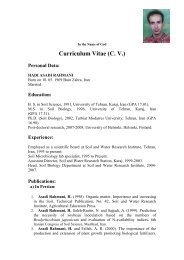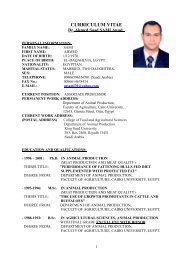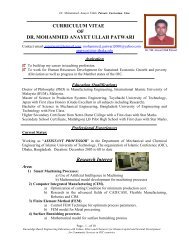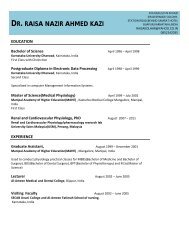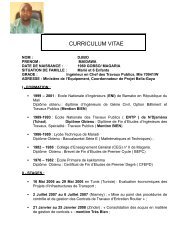Engineering: issues, challenges and opportunities for development ...
Engineering: issues, challenges and opportunities for development ...
Engineering: issues, challenges and opportunities for development ...
Create successful ePaper yourself
Turn your PDF publications into a flip-book with our unique Google optimized e-Paper software.
World Federation of <strong>Engineering</strong> OrganizationsBarry J. Grear AO, President WFEO 2007–09This Report presents an important opportunity. As the firstever international report on engineering, it gives the world’sengineering community a chance to present the significantcontribution that engineering makes to our world.The Report explores the main <strong>issues</strong> <strong>and</strong> <strong>challenges</strong> facingengineering <strong>for</strong> <strong>development</strong> – <strong>for</strong> the <strong>development</strong> ofengineering <strong>and</strong> the crucial role of engineering in international<strong>development</strong>.The concerns, ideas <strong>and</strong> examples of good practice captured inthis Report provide valuable in<strong>for</strong>mation <strong>for</strong> government policymakers,engineering organizations, international <strong>development</strong>organizations, engineering colleagues <strong>and</strong> the wider public tounderst<strong>and</strong> the future of engineering, capacity needs, engineering<strong>and</strong> technical education, <strong>and</strong> engineering applications.I congratulate <strong>and</strong> thank all who have contributed to the<strong>development</strong> of the book <strong>and</strong> particularly the editor, Dr TonyMarjoram, who has been an encourager to the engineeringcommunity through his role at UNESCO.The World Federation of <strong>Engineering</strong> Organizations wasfounded by a group of regional engineering organizations <strong>and</strong>in 2008 we celebrated <strong>for</strong>ty years of its existence as an internationalnon-governmental organization. WFEO brings togetherregional <strong>and</strong> national engineering organizations from morethan ninety countries, representing approximately fifteen millionengineers; we are honoured to be associated with the productionof this first UNESCO <strong>Engineering</strong> Report.StatementsInternational Council of Academies of <strong>Engineering</strong> <strong>and</strong> Technological SciencesGerard van Oortmerssen, President CAETS, 2008CAETS, the International Council of Academies of <strong>Engineering</strong><strong>and</strong> Technological Sciences, recognizes the importance ofrevitalizing engineering as a profession.Engineers are responsible <strong>for</strong> technological <strong>development</strong> thathas created our modern society; they have built infrastructure,industrial production, mechanized agriculture, moderntransportation systems, <strong>and</strong> technological innovations suchas mass media, computers <strong>and</strong> communication systems.Technological <strong>development</strong> is continuing at an ever-increasingpace, especially in new areas such as in<strong>for</strong>mation <strong>and</strong>communication technology, nanotechnology <strong>and</strong> biotechnology.These <strong>development</strong>s are exciting, require increasedengineering capacity <strong>and</strong> deserve public acclaim. Technologicalinnovations have created wealth, facilitated our life <strong>and</strong>provided com<strong>for</strong>t.For some. But not <strong>for</strong> all.Prosperity <strong>and</strong> economic <strong>development</strong> are not distributedequally over the world. Realization of the United Nations MillenniumDevelopment Goals will require significant ef<strong>for</strong>t byengineers, but also creativity because the contexts of developingcountries often requires new ways of doing things or therediscovery of traditional techniques.In addition, there are new <strong>challenges</strong> <strong>for</strong> engineers. Our societyis facing problems, which, to some degree, have been caused by<strong>development</strong>s <strong>for</strong> which engineers are responsible: the depletionof natural resources, environmental problems <strong>and</strong> climatechange. Talented engineers are needed to provide solutions<strong>for</strong> these problems through greater efficiency in productionprocesses <strong>and</strong> transportation systems, new sustainable energysources, more efficient use of materials, the recovery of materialsfrom waste... the list is long.There is growing dem<strong>and</strong> <strong>for</strong> engineering talent from a growing<strong>and</strong> developing global population. And the nature of engineeringis changing. <strong>Engineering</strong> has always been multi-disciplinaryin nature, combining physics, chemistry <strong>and</strong> mathematicswith creative design, invention <strong>and</strong> innovation; but its scopeis increasing. Engineers, more <strong>and</strong> more, have to be aware ofthe social <strong>and</strong> environmental impacts of technology, <strong>and</strong> haveto work in complex teams, interacting <strong>and</strong> cooperating withsociety.It is un<strong>for</strong>tunate that, under these circumstances of growingneed <strong>for</strong> multi-talented engineers, the interest in engineeringamong young people is waning in so many countries. Awarenessof the importance <strong>and</strong> the changing nature of engineeringshould be raised in circles of government as well as thegeneral public.CAETS there<strong>for</strong>e very much welcomes this UNESCO ef<strong>for</strong>t toexplore the current state of engineering, <strong>and</strong> the <strong>issues</strong> <strong>and</strong><strong>challenges</strong> <strong>for</strong> its <strong>development</strong> <strong>and</strong> <strong>for</strong> global <strong>development</strong>.7




